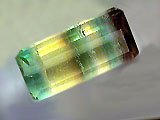![]()
Name:
Fluorite

Chem:
CaF2
Calcium Fluoride
Crystal:
Cubic (cubes, octahedrons, dodecahedrons)
Color:
clear, blue, yellow, purple, pink, green, brown, orange
Refrac. Index:
1.43
Birefraction:
none
Hardness:
4
Spec. Grav.:
3.18
Fracture:
even to conchoidal
Cleavage:
perfect
Environment:
hydrothermal veins, pegmatites, sublimation product in some volcanics
Association:
quartz, cassiterite, topaz, apatite, sulfides,
Locals:
| Italy | Switzerland | Brazil | Germany | Canada | Ill., Ken., USA |
Misc:
From the Latin "fluere", meaning" to flow". It was used in ancient times as a flux. Contact with sulfuric acid releases HF gas (very toxic!) Often fluorescent in UV.
Gem info:
Used by ancients to carve bowls, vases, goblets etc. It is extremely soft and can only be used in jewelry if very well protected. It also has perfect cleavage making it subject to easy fracture. There has recently been a number of cut stones in the market coming from China. It is very inexpensive, but the cut stones tend to be fairly large.
![]() long
rec.
long
rec.
![]() short
rec.
short
rec.